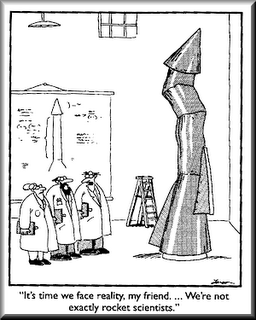
"There was, too, a wonderful simplicity of desire. It was the last time that people would be thrilled to own a toaster or waffle iron."
-- Bill Bryson, The Life and Times of the Thunderbolt Kid
Bill Bryson writes: In 1951, when the averge American ate 50% more than the average European, Americans owned 80% of the world's electrical goods, produced more than 40% of its electricity, 60% of its oil, and 66% of its steel. America's 5% of the world's population had more wealth than the other 95%. In fact, 99.93% of new cars sold in 1954 were U.S. brands. By the end of the 50's, GM was a bigger entity than Belgium, and Los Angeles had more cars than did Asia -- cars for a gadget-smitten people, cars with Strato-Streak engines, Strato-Flight Hydra-Matic transmissions and Torsion-Aire suspensions. The 1958 Lincoln Continental was 19 feet long. And before television arrived (in 1950, 40% of Americans had never seen a television program; by May 1953 Boston had more televisions than bathtubs).
Consider what was new or not invented then: ballpoint pens, contact lenses, credit cards, power steering, dish-washers, garbage-disposals. In 1951, a Tennessee youth was arrested on suspicion of narcotics possession. The brown powder was a new product--instant coffee.
Unlike today, when everything edible, from milk to bad spinach and mad cows, has its moment as a menace to health, in the 50's everything was good for you. Cigarettes? Healthful. Advertisments, often featuring doctors, said smoking soothed jangled nerves and sharpened minds. (What WERE we THINKING?) X-rays were so benign that shoe stores installed them to measure foot sizes. In Las Vegas, downwind from atomic weapons tests, government technicians used Geiger counters to measure fallout. People lined up to see how radioactive they were. It was all part of the fun! What a joy it was to be indestructible.
And indestructible we were then. "People knew, without a warning lable," Bryson notes dryly, "that bleach was not a refreshing drink."
White House security precautions were so lax that on April 3, 1956, a disoriented woman from Michigan detached herself from a tour group and wandered around the White House setting little fires. When found, she was taken to the kitchen and given a cup of tea. No charges were filed. The 50's did have worries. You could get 14 years in an Indiana prison for instigating anyone under age 21 to "commit masturbation." And to get a New York fishing license, you had to swear a loyalty oath.
But yes, we were still indestructible.
In September of 1957 I met my very best friend (who remains to this day my very best friend) Janet Lane. We loved each other enourmously from the start. We shared a small upstairs room at the Playhouse Women's Dorm, with ugly orange furniture and a view of the Playhouse, three blocks away. She was 19, a year older than I was. Her hair was red, her eyes dark brown, and her cheeks had dimples. I thought she was very beautiful and very sophisticated. She thought her nose was too large. "It's
my father's nose," she used to wail. SHe smoked. Sometimes we talked all night long, whispered to each other things we had never told anyone else. She swore, and taught me to swear. (I don't swear anymore--much--but I still know how). She informed me which of our fellow students were "gay," and what being "gay" was. (I was dumbfounded and amazed. What an incredible and inconceivable revelation this was!) She gave me sisterly advice: "For Heaven's sake, fix yourself up a little bit, use some more make-up. Eye shadow. And don't wear pink! You look like Alice in Wonderland in pink."
"You glow on stage," she told me later.
The dorm, actually Hale Residence Hall, had rules. All meals must be eaten in the dining room, not in the kitchen, and on trays provided you. (Well, I always ate in my room, vegetable soup, cold spaghetti, directly from the can). The piano must be used ONLY from 7:00-8:00 p.m., the television must be turned off at 10:00 p.m., and of course, may not be played at the same time. Callers must always be out of the dorm by 10:00 p.m. (There was a ladder the girls used to climb out the windows, or to allow callers to climb in.) On SATURDAY and SUNDAY mornings, no caller is permitted in the dorm before noon...etc etc etc.
We worked hard, preparing to be famous. We rehearsed often until near midnight, and then went to "Tops" to eat French fries before going home to bed. We exchanged photo stills from whatever show were were doing. I worked with wonderful, witty, talented people: Myrna Fahey was beautiful, had done several movies, and was sweet to me. Gita Maynard thought I was lovely, and Barbara Drew signed her photo, "Joyce, you've been a darling...." Holly Harris was spectacular, Jerry Oddo, playing Sakini in Teahouse of the August Moon scrawled his autograph on a program cover, and wrote: "To my personal Alice in Wonderland. My love and kisses for being so wonderful to work with. You will find your 'cricket'." Lisa Liu was was charming and graceful as the Japanese sweetheart. From another old program cover: Holiday for Lovers. "All the best, from here on to the top!" I actually shook hands with Burt Lancaster, and Bette Davis, and Piper Laurie! Burt smiled broadly and looked right past me, Bette wore a turban, and Piper was--well, really, really beautiful. Well. We were nothing if not optimistic. Alice in Wonderland. It was an image that seemed to follow me around, and when I actually had the opportunity to be Alice at the newly-opened Disneyland, I turned it down because I was homesick, and wanted to spend the summer at home. Charlotte Stewart, who lived in the room next door grabbed it, and went from there to a regular role as the schoolteacher on the Little House on the Prarie TV series. My friend Makoto Iwamatsu, "Mako," did the best "Puck" I have ever seen in Shakespeare's Midsummer Night's Dream, and went on to be nominated for an Academy AWard "Oscar" for his performance with Steve McQueen in The Sand Pebbles. Margaret O'Brien and John Drew Barrymore did Romeo and Juliet on the Mainstage. Most of us you have never heard of.
I wanted to write. I bought a bicycle for five dollars and pedaled it down the hill to Pasadena City College, where I took writing classes from my first real "mentor," Helen Hinckley Jones, a marvelous teacher and friend, who had written histories of Israel and Iran, of Utah and the railroad, and another book about Iran, A Wall and Three Willows. She liked what I wrote, and took a special interest in me. She loved me, and I loved her. Years later, when I began to publish articles and poetry, and wrote Chrysalis, she wrote me letters of congratulations and encouragement. But that's a story for another day.
My roommie Jan was going with (and later married) David Isenhart, a young artist from San Francisco, who had studied painting with Richard Diebenkorn. His paintings were large and abstract, with thick swatches of color. He made pottery, fashioned himself a necktie out of brown yarn, cat hair, and popsicle sticks. He dripped colored wax candles over the tops of wine bottles. He read books by Lawrence Ferlinghetti,Kenneth Patchen, Jack Kerouac, and Alan Ginzberg. I read them, too. We were birds of a feather. Janet said we were the "only true beatniks" she knew. I kind of wafted from the end of the "beat" generation into the "Flower Children," and ended up becoming a "hippie" of sorts, and stayed that way. But that's another story for another day.
I ran around with sweet Bobby Giles, who was inescapably "gay," who wanted to be a writer as well as an actor, and who, bolt out of the blue, decided he was in love with me and wanted to get married. Kissing Bobby was like kissing a plastic doll. This was an unforseen event that surprise me, but we remained good friends until his death, writing letters, sending pictures and Christmas cards and such, even had a few visits in between his visits from the Philippines and Japan. The last time I saw him we lived in Provo, Utah. I was married and had three little boys, and was about eleven months pregnant with the fourth, another boy. Another story.
I went out (for a while) with some cowboy dude whose name I can't remember, who thought he was John Wayne, and who, on a hike in the mountains, left me stranded on a huge rock because he had no idea how I should get down. I figured it out. I went out (for a while) with a fellow from Cal Tech, a true egghead rocket scientist, whose apartment walls were papered with pictures of near-naked girls torn out of Playboy Magazines. I carried on a long-distance romance with a cute sailor named Chuck, who after we broke up sent me a long letter signed with a skull and crossbones. I went with an actor, a champion fencer, who drove an Aston Martin, whose mother was an opera singer and father was a biologist who researched regeneration of tissues by cutting earthworms into pieces (another story, probably best left untold). And another with a boy named Jerry Meyers, who kept an aviary of birds in his yard, who called me "Juice," made fishing lures with peacock feathers he kept in big bright green and purple bouquets. Jerry loved photography, loved martial arts, and had a black belt in Karate. He could break bricks with his fingertips. It was while I was with Jerry that I met the love of my life, the real deal.
Marv was an idealist, a dreamer with the soul of a poet. We ate Mexican at Ernie Jr.s, we had taquitos on Olvera Street, and shared one headphone at the city library, listening to Bach's Brandenburg Concertos. I think of our time together as bonfires at the beach, waterfront carnival lights reflected in the water, seen from the top basket of the ferris wheel. He was folk songs on his guitar, and collections of sea-shells. He was long walks out to the end of the pier where little boys and old men threw fishing lines out into the waves, and he was the shrill cries of seagulls. I knew what his favorite color was, and he thought I was a "fairy princess." We sat in our shallow sandstone cave and looked out at the ocean. We ate tuna fish sandwiches, and he wrote I LOVE YOU on the brown lunch bag and hid it in a hole in the rocks. Sometime, we said, we'll come back, in fifty years or so, a little wrinkled white haired lady and gentleman, holding hands, to see if it is still there. Our bodies were covered with sand and salt. We laughed and were happy and alone in
the world. I never said "I love you" to anyone else.
.














